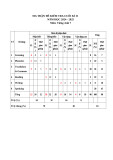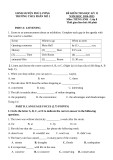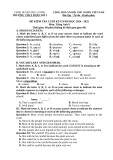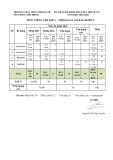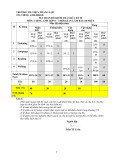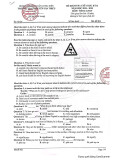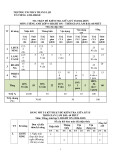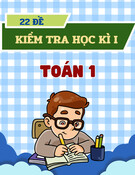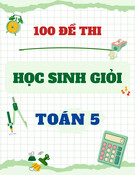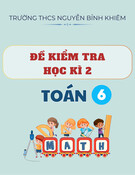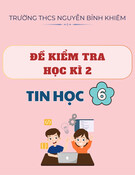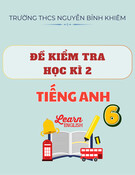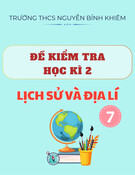
Page 1 of 11 pages
SỞ GD&ĐT HẢI DƯƠNG
KỲ THI CHỌN ĐỘI TUYỂN DỰ THI HSG CẤP TỈNH
TRƯỜNG THPT CHUYÊN NGUYỄN TRÃI
NĂM 2021-2022
Môn thi: TIẾNG ANH
Thời gian thi: 180 phút (không kể thời gian giao đề)
Ngày thi: 12/9/2021
Đề thi có 11 trang
Thí sinh không được sử dụng tài liệu, kể cả từ điển.
Giám thị không giải thích gì thêm.
____________________________________________________________
I. LISTENING
HƯỚNG DẪN PHẦN THI NGHE HIỂU
Bài nghe gồm 4 phần; mỗi phần được nghe 2 lần, mỗi lần cách nhau 05 giây; mở đầu và kết thúc
mỗi phần nghe có tín hiệu.
Mở đầu và kết thúc bài nghe có tín hiệu nhạc. Thí sinh có 02 phút để hoàn chỉnh bài trước tín hiệu
nhạc kết thúc bài nghe.
Mọi hướng dẫn cho thí sinh (bằng tiếng Anh) đã có trong bài nghe.
Part 1. For questions 1-5, listen to a talk about top five artificial intelligence colleges. What
does the speaker say about each college? Choose five answer from the box and write the
correct letter, A-I, in the corresponding numbered boxes provided.
A. provides students with both courses and research prospects in its lab.
B. first began its research into artificial intelligence around six decades ago.
C. offers prominent graduates with enormous career opportunities right at home in South
California.
D. had its first artificial intelligence research center established in 2015.
E. is one of the best video game colleges and holds the first spot in the list of AI institutes.
F. has one of the most cutting-edge lab for research and robotics in the world.
G. includes more than two dozen faculty members and over a hundred graduate students.
H. makes investments in both technical and ethical aspects of using AI.
I. makes a name for itself as the most prominent lab worldwide.
Colleges
1. Harvard University
2. University of California, Berkeley
3. Massachusetts Institute of Technology
4. Stanford University
5. Carnegie Mellon University
Part 2: For questions 6-10, listen to a report about live chicken feed and complete the
summary below. Write NO MORE THAN THREE WORDS taken from the recording in each
blank.
- Woodland, which houses thousands of (6) __________ chickens and millions of black soldier fly
larvae, is a family-run farm in Cambridgeshire.
- At Woodland, the chickens’ diet now consists of home-grown insects, which are produced by an AI
system that can directly upcycle by-products, rather than (7) __________ wheat as previously.
- To (8) __________ the process of insect production for farmers is the aim of Better Origin, the
University of Cambridge spin-out running the trial.








